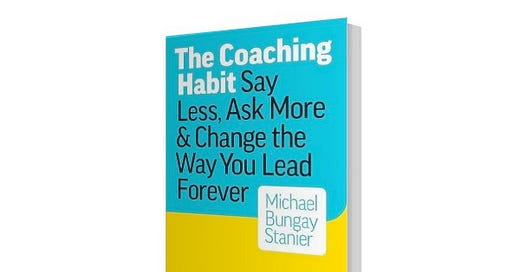Hi everyone, here’s what we have for you this week:
What self-limiting beliefs are holding back your business? In this week’s episode of The Everyday Leader, Joseph Rutakangwa from Rwazi reflects on a breakthrough he had while working with an executive coach that led him to 10x his startup’s monthly revenues.
Seven useful questions for coaching sessions. Whether you’re a professional coach or a manager coaching your team member, we share several go-to questions from Michael Bungay Stanier’s The Coaching Habit.
Read on for more details…
Managing a network of 10,000 freelancers, keeping your startup team focused, and identifying self-limiting beliefs with an executive coach to unlock business growth
Joseph Rutakangwa is the Founder and CEO of Rwazi, a data services company providing organizations with on-ground data on products, services, and activities from developing countries. Here are a few highlights from the conversation with Joseph:
Managing a network of freelancers involves understanding and building around their day-to-day incentives and motivations: Joseph’s startup Rwazi works with over 10,000 freelance data collectors. These “mappers” must opt-in to take on specific assignments, which has led to the need to price and schedule assignments to ensure there will be enough submissions to gain a minimum sample sizes for his clients. He also uses a team of local field auditors to confirm accuracy. Joseph also recently made a strategic investment in a partner company, KrediblePro, founded by another ALU alum, as part of their partnership to conduct reference checks of new mappers when they join their network in cases where specific skills are required.
Too much integration of different department teams can lead to distractions or office politics: As a startup founder, Joseph has found it helpful to keep his different teams in silos (one focused on maintaining the mapper network and the other focused on serving company clients). While he keeps his team leaders aware of high-level strategy, his teams enjoy being able to focus on their core work areas, which gives them ownership and focus.
Identify self-limiting beliefs with an executive coach to unlock business growth opportunities: Joseph has worked with an executive coach, alongside his ongoing business mentorship support. His coaching sessions focused on more deeply understanding his leadership style and business decision making frameworks. During his conversations with his coach, he identified a number of self-limiting beliefs that, despite his startup’s strong start, were holding him back from truly unleashing the full potential of his company’s business model. One mental barrier that he held was the assumption that he should double down on his business’ focus within Africa. But when he reexamined this assumption with his coach, through the lens of his ambition for what he wanted to achieve for his company and other intrinsic motivations, he realized that he didn’t have a strong answer to why he wasn’t already capable of expanding his business development efforts to other markets. Within a few months of changing his mindset, his business’s monthly revenue had increased by 10x.
Seven useful questions for coaching sessions
Michael Bungay Stanier is a well-known thought leader in the coaching space. His 2016 best-seller The Coaching Habit lists questions that can be helpful in almost any type of coaching session.
What’s on your mind?
And what else?
What’s the real challenge here for you?
What do you want?
How can I help?
If you’re saying yes to this, what are you saying no to?
What was most useful for you?
Which of these prompts would be helpful for you to include more of in your own conversations?




